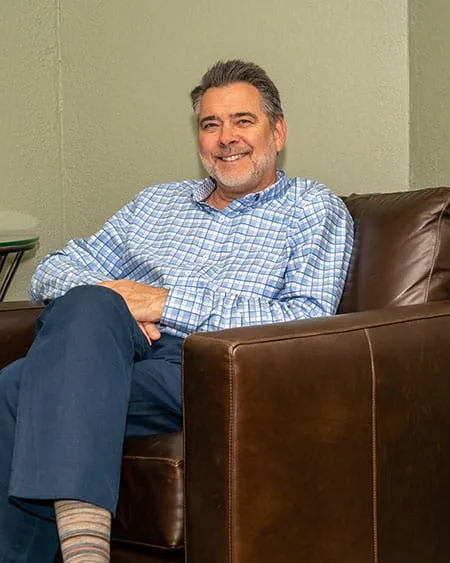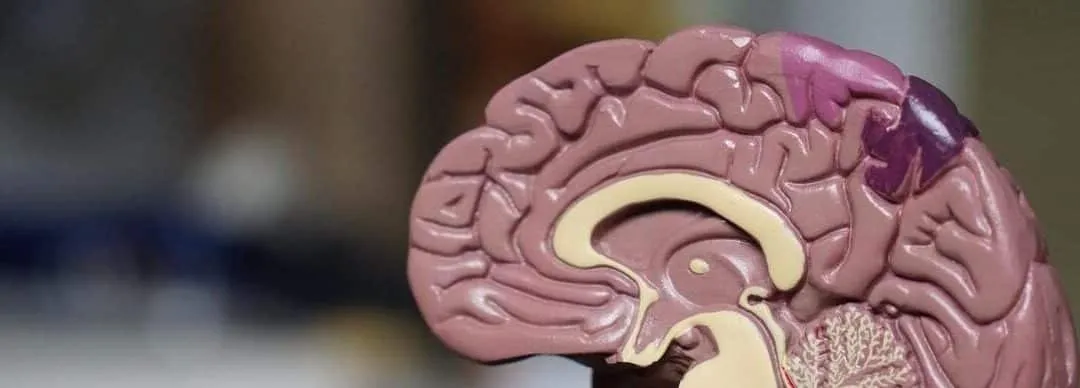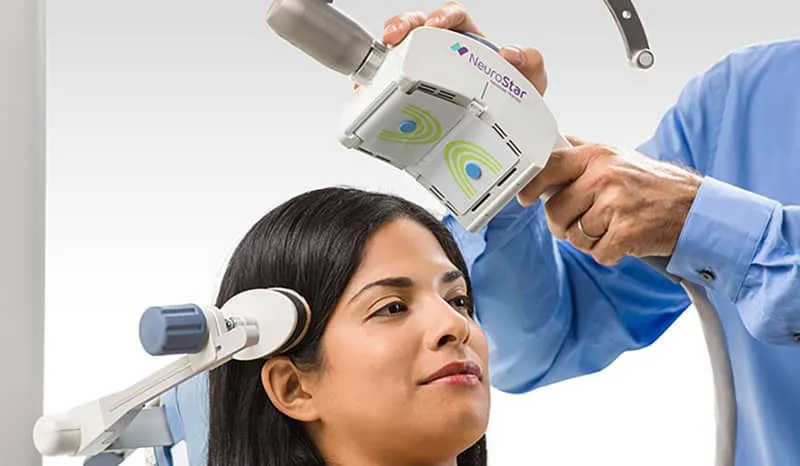How Can TMS Change a Life & The Brain?

Reading statistics about the success rate is vastly different from hearing first-hand what actually happens when TMS changes the brain – AKA, the life – of someone who has known nothing but depression for as long as they can remember.
Every good story has a problem to solve. Really good stories have a deeply satisfying solution to the problem. Following is the true story of a woman experiencing severe depression. She has graciously agreed to share her experiences with depression and TMS with truly satisfying results in her life.
How TMS Therapy Saved the Life of Katie C.
Busy attorney, wife, mother, and life-long depression sufferer. This is her story, in her own words, told with the hope that other depression sufferers will be encouraged by the way Transcranial Magnetic Stimulation Therapy has changed her life, and use TMS treatments to achieve satisfying changes in the story of their own lives.
“Growing up, I remember having times when I felt I could not get out of a bad mood, when I would feel bad about myself for not wanting to do things with my family or do things that others might enjoy. I remember having to discipline myself to do things I did not have any desire to do, like spending time with friends and family. I experienced a lot of negative thoughts about myself and pushed myself to do better and be better so that I would not feel that way. At the time, I did not identify those thoughts, feelings and experiences as depression.I first remember experiencing debilitating symptoms of depression in college. I came home for winter break after the fall semester in 2000 and slept the whole time. After the episode during the break, I went back to school and continued with my life. Staying busy helped. I played softball in college, so I did not have time to stay in bed. In 2002, when I was graduating from college, I considered seeing a counselor and getting treatment for depression but decided not to because I was afraid of what people might think if they saw that in my medical records. I went on to law school, became a lawyer and went to work.”
“In 2009, I had my son and suffered from postpartum depression. Inside, I was desperate. At the time, I was not conscious of how terrified, depressed and alone I felt.
I started seeing a therapist in December 2011. She helped me to understand that what I was experiencing was not normal, but I was not willing at that point to admit that it was something I could not fix by myself. I saw her for six months and then stopped. I decided to work more at my job and to find other ways to make myself feel better that turned out to be destructive and did not relieve my depression.
Things kept building. My son was difficult, frequently in trouble at school and defiant. The groceries, laundry, house cleaning, my son’s behavior problems, I took all on myself, alone. I felt I had no help. Everything was a chore, slogging through that heavy resistance to life that is depression. In the mornings, I would think, “I cannot get up. But, if I do not get up and go to work, they will fire me. Then, we will not be able to pay our mortgage. So, I must get up.” At the time, it felt normal to live life like that, against so much resistance.By June 2014, I was divorced and suicidal again. For about a month, I struggled against the suicidal thoughts and finally was losing the battle; I really was afraid I would kill myself. I decided to see a psychiatrist. I was still afraid of what people might think if they found out I was getting treatment for depression or was on antidepressant medication. But, because I was scared of my suicidal thoughts, I finally decided to see a psychiatrist who prescribed antidepressant medication, and it really helped the suicidal thoughts. It also helped to level me out.”
“I have grown a lot since 2014. With the help of a life coach, medication and counseling to treat my depression, and my friends and family, I have accomplished things I thought I never would: completed several half marathons and a full triathlon; learned how to scuba dive, knit, and drive a stick-shift car; designed and built a new house (where we now live); became Catholic and remarried.Even though I was able to accomplish a lot of things while taking antidepressants, I still struggled with negative thoughts, hopelessness, and a feeling of just not really wanting to do anything. I suffered from panic attacks. I was frustrated because I was doing everything I was supposed to be doing to manage my depression – exercising regularly, eating well, maintaining connections with my friends and family, sleeping well – but still I struggled to feel good about what I was doing. Everything took so much discipline. It was as if my life was just checking items off a “to do” list. I got no pleasure out of what I was doing other than saying that I had finished it. I accomplished things, but it felt like a lot of times it was against my will. I was often short-tempered, irritable, overwhelmed and angry. I thought I was just an impatient person and needed to become a better person. I thought I was stressed by all my family and work obligations.
Now that I have completed my TMS treatment and do not feel that way any more, I realize that so much of the anxiety and anger I experienced was not because I am a bad person with a negative outlook on life that needs to be changed; instead, I was suffering from a terrible disease that destroyed everything about life that is worthwhile–loving relationships, friendships, self-esteem, desire for a better future, and hope.
Over several years, I tried many different antidepressant medications, including Lexapro, Wellbutrin, Cymbalta, Trintellix, and Prozac. Cymbalta worked for a while, but then it stopped working last year, and I now take Pristiq.”
The initial Impact of TMS Therapy on the Brain
“Early in 2020, I went in for a routine visit to see Dr. Griffith. I was feeling overwhelmed and anxious. Nothing seemed to be going right. Dr. Griffith acknowledged I was doing everything I could to manage my depression myself: taking my medicine, exercising, eating well, sleeping well, staying connected with family and friends. He asked if I had heard of TMS and whether I would be interested in trying it.
I was so tired of living with depression. I was willing to try anything.
Although I was skeptical about TMS working for me, I agreed to go through the process.
After my first treatment in March 2020, I wanted to quit. I worked myself into a terrified state because I did not know what to expect from life without depression. Worse, I did not know who I would be without depression. I had to overcome a very real fear about letting go of my depression. It had been part of who I was for so long, I was afraid I would not like who I was without depression. I would lose an important part of who I am, and I would lose an important part of how I think about and cope with life. The negativity had become a way of shielding me from disappointment and pain. If life was all pain, regardless of what I did, then there was no way to be disappointed. The first step I had to take in order to motivate myself to do TMS was to be willing to finally let go of my depression and be willing to get better.
I was extremely anxious going into the first treatment and a little panicky. That made it difficult for me to sit still in the position necessary, and I ended up with a tension headache. I was desperate to get rid of my depression though, so I talked myself into returning for the next treatment, and the next. I began experiencing positive results within the first two weeks. I started having hope.”
How TMS Therapy Saved Katie’s Life
“The results came to me in the form of beautiful, positive thoughts that I noticed because it was so rare for me to have them. One morning sitting on my porch drinking my coffee I thought, “It is so beautiful to hear the birds this morning.” That struck me as strange because I did not normally think things like that. My thoughts are usually consumed with fear, anxiety, worry and dread. Another morning, I was walking and I thought, “The sunlight coming through the trees is really beautiful.” Another morning, when I woke up, my first thought was, “I am so happy I get to spend the day with my son and husband.” That is how the recovery started–how I first began to notice that things in my mind were changing.The TMS treatments were slightly uncomfortable because of how still I had to be, and several times I wanted to quit because I did not like the discipline of having to go every day. But, when I thought about the result that I was getting, the changes in my thoughts that changed the way I live, I was motivated to continue going back. The results make all of TMS worth it.
I finished my last session a couple weeks ago. It is hard to even describe how relieved and grateful I feel every day to have the burden of depression lifted from me. The best part is that I feel I now have a choice about my thoughts. When I start to think about things in a negative way, I can make a choice to reframe my thoughts. I am more aware of how my thoughts affect my feelings. Before TMS, when I was feeling overwhelmed, anxious or negative, try as I might, I could not change that. I had to just wait it out until I felt better. Now, my mind is open to practices that help me to look at situations more positively. My husband says he has noticed that I react to life differently, with less “amplitude,” he says. I do not get angry as quickly and I have more patience as we work through problems. In my own head, it is so much easier for me to see “problems” as opportunities for growth.
It continues to amaze me that so much of what I did not like about myself was actually a disease that I had no control over. When I hear someone talking who is depressed, I can hear the depression talking. I can spot it. Before, those types of depressed thoughts and ways of thinking seemed normal to me. I did not see them as a disease. Today, I get up without my first thoughts being filled with anxiety or worry. I find things about my day that I look forward to doing. I have goals and enjoy working toward them. And the things I don’t like doing, I know they are temporary.
I want others to know that in my experience, TMS can be a solution to chronic depression. I would not have believed it if I had not experienced it myself, but it has worked for me.”
Katie C.
How the Griffith Psychiatry Can Help You Battle Life-Long Depression
If you are losing the battle against depression, perhaps it’s time to look at an alternative, non-medication treatment. TMS therapy is a great option for those that have ‘stubborn’ depression–otherwise known as TRD. If you have Treatment Resistant Depression and nothing is working against your depression, you want to avoid taking medication, you’re a perfect TMS candidate. The typical TMS patient has tried multiple antidepressants without satisfactory relief. At Dr. TMS Therapy over 80% of our patients have positive, life-saving outcomes from TMS and see significant depressive relief. Over 50% achieve remission–they walk out “all better,” or 100% free from depressive symptoms.
TMS therapy is a way to get your life back. Positive TMS results can mean many different things: healthier sleep patterns, better focus and motivation, more quality time with friends and family, excitement and happiness and much more. If you or a loved one are experiencing subpar results from antidepressants, it may be time to look for an alternative. If you’re interested in learning more about TMS therapy, we’d be happy to set up a free consultation to see if TMS is right for you. Contact us today, and we will get back to you as soon as possible.
A Word from Dr. Griffith on Treating Katie with TMS Therapy

“Depression affects one in four women and one in eight men in their lifetime.“
“It has been a fulfilling journey as a psychiatrist helping Katie conquer depression.
Katie is not alone in her experience with depression or with TMS therapy. Her story of fighting depression is quite typical–chronically battling loneliness, pessimism, worthlessness, and loss of motivation. The end result is family, social, occupational, and psychological paralysis. Life becomes an overwhelming fight to survive and to overcome the strong urge to give up. Depression affects one in four women and one in eight men in their lifetime.
Although Katie possessed immense internal and external beauty, talent, intelligence, career success, and was surrounded by loving family and friends, she still remained depressed. She diligently sought help through psychotherapy and support groups which offered some benefit, but were not enough to reverse depression because of underlying chemical imbalances. She then turned to the medical interventions, but numerous antidepressant medication trials offered only temporary or partial relief or intolerable side effects.
The turning point in Katie’s long battle to overcome depression was deciding to try TMS. TMS is FDA-approved and covered by most health insurance companies. It is a safe, outpatient treatment. TMS offers a powerful tool to defeat depression and establish a joyful life. Like many others who have similar stories of life-changing results with TMS, Katie benefited from this non-medication treatment that uniquely and safely provides electro-magnetic stimulation to reawaken “sleepy,” depressed brain cells. TMS is targeted directly toward the specific region of the brain where depression occurs. Katie’s transformation from TMS was dramatic. TMS restored her joy and her full participation in life. She regained desire to be with family and friends, pursue hobbies and exercise, and her work again became exciting and challenging. More good news for Katie and others who receive TMS is that long-term studies show that TMS provides significant long-lasting recovery and benefit.”
– Dr. Griffith
“Long-term studies show that TMS provides significant long-lasting recovery and benefit.”
A common mental health question people tend to ask themselves is whether depression is genetic or environmental?
We would love to talk to you about what we can do to help you or a loved one.
Request an Appointment
Our care team would love to hear from you! We want to see our patients get healthy.
This is our top priority.
- 727-577-1203
- Free Consult







